
Coleman Randolph Hawkins, nicknamed "Hawk" and sometimes "Bean", was an American jazz tenor saxophonist. One of the first prominent jazz musicians on his instrument, as Joachim E. Berendt explained: "there were some tenor players before him, but the instrument was not an acknowledged jazz horn". Hawkins biographer John Chilton described the prevalent styles of tenor saxophone solos prior to Hawkins as "mooing" and "rubbery belches." Hawkins cited as influences Happy Caldwell, Stump Evans, and Prince Robinson, although he was the first to tailor his method of improvisation to the saxophone rather than imitate the techniques of the clarinet. Hawkins' virtuosic, arpeggiated approach to improvisation, with his characteristic rich, emotional, loud, and vibrato-laden tonal style, was the main influence on a generation of tenor players that included Chu Berry, Charlie Barnet, Tex Beneke, Ben Webster, Vido Musso, Herschel Evans, Buddy Tate, and Don Byas, and through them the later tenormen, Arnett Cobb, Illinois Jacquet, Flip Phillips, Ike Quebec, Al Sears, Paul Gonsalves, and Lucky Thompson. While Hawkins became well known with swing music during the big band era, he had a role in the development of bebop in the 1940s.

Duke Ellington at the Bal Masque is an album by American pianist, composer and bandleader Duke Ellington recorded in 1958 and released on the Columbia label.
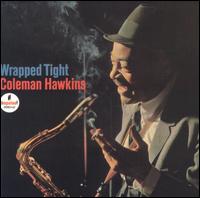
Wrapped Tight is an album by American jazz saxophonist Coleman Hawkins, featuring performances recorded in 1965 for the Impulse! label.

Rush Hour is an album by the American jazz saxophonist Joe Lovano featuring an orchestra arranged and conducted by Gunther Schuller recorded in 1994 and released on the Blue Note label.

Coleman Hawkins with the Red Garland Trio is an album by saxophonist Coleman Hawkins with pianist Red Garland's trio recorded August 12, 1959 and released on the Swingville label.

Coleman Hawkins All Stars is an album by saxophonist Coleman Hawkins featuring trumpeter Joe Thomas and trombonist Vic Dickenson which was recorded in 1960 and released on the Swingville label.
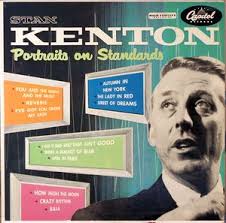
Portraits on Standards is an album by pianist and bandleader Stan Kenton with featuring performances of jazz standards recorded in 1953 and originally released on the Capitol label as a 10-inch LP.

Back to Balboa is an album by bandleader and pianist Stan Kenton featuring performances recorded at the Rendezvous Ballroom in 1958 and released on the Capitol label.

The High and Mighty Hawk is an album by saxophonist Coleman Hawkins which was recorded in 1958 and released on the Felsted label.

Hawkins! Eldridge! Hodges! Alive! At the Village Gate! is a live album by saxophonists Coleman Hawkins and Johnny Hodges with trumpeter Roy Eldridge which was recorded at the Village Gate in 1962 and released on the Verve label.

Back in Bean's Bag is an album by saxophonist Coleman Hawkins with trumpeter Clark Terry which was recorded in late 1962 and released on the Columbia label.

The Hawk in Paris is an album by saxophonist Coleman Hawkins featuring compositions related to Paris performed with an orchestra arranged and conducted by Manny Albam which was recorded in 1956 for the RCA Records subsidiary Vik label.
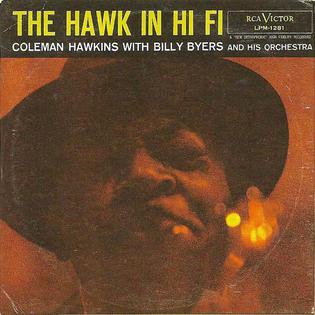
The Hawk in Hi Fi is an album by saxophonist Coleman Hawkins with an orchestra arranged and conducted by Billy Byers. It was recorded in early 1956 and released on the RCA Victor label.
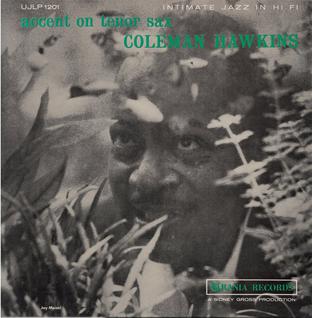
Accent on Tenor Sax is an album by saxophonist Coleman Hawkins which was recorded in 1955 for the Urania label.

The Hawk Talks is an album by saxophonist Coleman Hawkins compiling tracks recorded between 1952 and 1953 for the Decca label which were first released on LP in 1955.
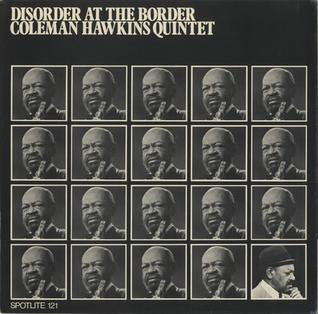
Disorder at the Border is a live album by saxophonist Coleman Hawkins compiling tracks which were originally broadcast in 1952 and first released on LP in 1973 on the UK Spotlite label.

The Saxophone Section, is an album by saxophonist Coleman Hawkins which was recorded in 1958 and released on the World Wide label.

Things Ain't What They Used to Be is an album by the First Annual Prestige Swing Festival featuring two all-star groups, one including Coleman Hawkins, Hilton Jefferson, Jimmy Hamilton and Joe Newman and the other led by Al Sears with Buddy Tate, Pee Wee Russell and Joe Thomas which was recorded in 1961 and first released on the Swingville label as a double album before being reissued as two single discs with Hawkins name prominently displayed; Things Ain't What They Used to Be and Years Ago. All tracks were also reissued as Jam Session in Swingville which was credited to Hawkins and Russell.

Sirius is an album by saxophonist Coleman Hawkins recorded in 1966 but not released by the Pablo label until 1974.

Rainbow Mist is an album by the American jazz saxophonist Coleman Hawkins compiling recordings from 1944 originally released by Apollo Records that was released by the Delmark label in 1992.




















